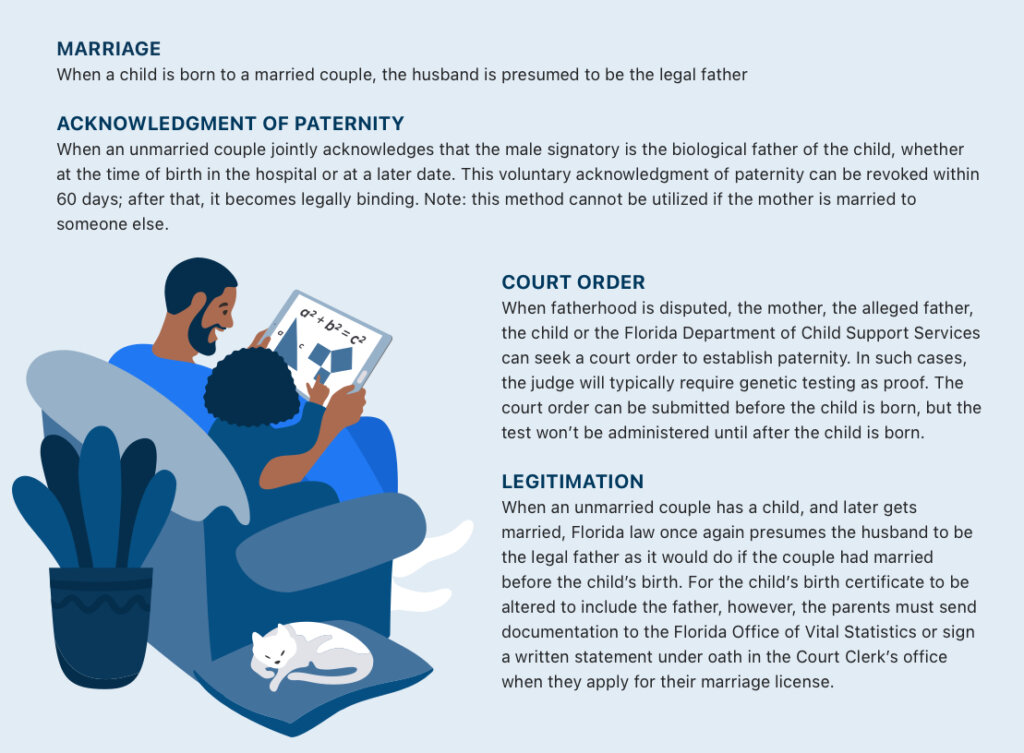An important part of our practice at Orlando Family Team is dealing with paternity matters for our clients. Paternity issues often arise during divorce, relative to child custody and support; they also feature in some adoption proceedings, and in regard to the ability of a child to receive her/his father’s benefits (e.g. health insurance, life insurance, Social Security, Veterans’ benefits). If you are questioning or trying to prove paternity in Orlando or the surrounding area, contact our paternity attorneys for experienced, empathic legal counsel.

Why Orlando Family Team Is the Place to Turn
Whatever the paternity situation you are attempting to resolve, our comprehensive legal knowledge and well-honed skills will give you the advantage you need. As a married couple with children of their own, our lead attorneys, Andrew Nickolaou, Esq. and Ophelia Bernal-Mora, Esq., B.C.S., are able to provide a unique dual perspective on paternity.
In addition to being accomplished paternity attorneys, both are fully aware of the sensitive nature and far-reaching consequences of determining paternity. Whether you are a man seeking joint custody of his child or a woman seeking child support from an ex-partner, we will always look out for your best interests and make you aware of all the legal ramifications of paternity results.
At times our clients are looking to disprove paternity in order to get out from under requisite child support. At other times, our clients are trying to prove paternity to ensure that their child will receive the financial support he/she is legally entitled to. Whatever your priorities, we will work vigorously to bring you a successful outcome.

Reasons for Verifying Paternity
There are a number of reasons our clients seek to establish paternity, including:
1. To establish rights as the legitimate father of a child conceived out of wedlock
DNA testing and sharp legal representation may both be necessary to make sure you retain rights to child custody, visitation (shared parenting time), and decision-making rights about your child’s healthcare, education, and religious upbringing. Every father (barring a history of abuse or violence) has the right to parent his child and to experience the rewards and responsibilities of parenthood. You can count on our legal team to arrange for paternity tests and strongly support your fathers’ rights.
If you are the biological father of the child, but not married to the child’s mother, it is wise for you to be present for the birth and sign the birth certificate. As the child’s biological father, you should file a paternity action with the court before the child is two, to verify your legal status as your child’s biological father. These actions will help keep you enmeshed in his child’s life if you separate from the child’s mother in the future.
It is important to know, however, that having the father’s name on the birth certificate does not automatically make you the child’s legal father, though it can be used as evidence in a legal paternity action.
Remember, because of all the complexity of paternity cases, even in the age of DNA genetic testing, it is essential to work with an experienced paternity attorney to give yourself the best chance of establishing legal paternity. By the way, the DNA test is simple, involving only a painless swab of the inner cheek of the child and potential father.
2. To question paternity of the husband in a marriage
Florida courts, in the interests of protecting the child, presume the husband is the legitimate father of that child. Whether or not he is the biological father, he is considered the “presumptive” father. Although either spouse can question the husband’s paternity, the presumptive father is expected to continue supporting the child until that child reaches maturity.
3. To establish the rights of a “putative” father
The state of Florida also recognizes “putative” fathers, i.e. those who believe they are a child’s father although not married to the child’s mother or who have been so designated by the child’s mother. The Florida Putative Father Registry provides for men listed to preserve their right to be given notice of court meetings involving the child and to give or withhold consent in the event of a planned adoption.

4. To establish whether the child’s “prospective” father is his/her legitimate father
A man is considered to be a prospective father if he:
- Cohabited with the child’s mother at likely time of conception
- Was married to the mother at the likely time of conception
- Was named by the mother on the child’s birth certificate
- Was named as the child’s father on an application for public assistance
None of these criteria, however, legitimize paternity without a paternity test.
5. To make sure child custody, visitation and child support are fair during divorce
Many of our clients are dealing with paternity issues because they are in the process of getting a divorce. Because the child’s legal father is responsible for support and also has custody or visitation rights as specified in the divorce agreement, if paternity is questioned by one or both spouses, it is crucial that the issue be resolved.
This is where Orlando Family Team comes in. Whether you are a mother trying to prove your child’s right to financial support from her/his father or a father wanting to ensure your ongoing role in the life of your child, our accomplished paternity attorneys are here to help you achieve your goal with as little stress as possible.
6. During Remarriages
Another time that paternity issues may surface is during a remarriage. Although the divorced father of the child retains parental rights after the biological parents part ways, there are times when the divorcing father or wife denies the ex-husband’s paternity. As noted earlier, whether or not the ex-husband wants to maintain a loving and consistent relationship with the child, he is legally obligated to support that child financially.
In some situations, the ex-husband may wish to disengage from the child as well as the ex-wife (especially if he is not the biological father), and the step-parent may be eager to adopt that child to create a new integral family unit. In such cases, we can assist in allowing the child to be adopted by the ex-wife’s new husband which will also free the ex-husband from the responsibilities of fatherhood for a child he does not consider his own.

7. When an Adult Wants to Identify Her/His Biological Father
In some cases, an adult offspring has never known who his/her father is or has reason to doubt whether the person in the paternal role is actually his/her biological father. In these cases, too, we can assist in getting the possible father tested for paternity to enable our client to begin a relationship with his/her biological father and/or claim benefits or inheritance rights to which he/she is entitled.
As you can see, paternity is an enormously complicated subject. In any of the above situations, the dedicated paternity attorneys at Orlando Family can help to untangle the seemingly endless twists and turns. We will clarify the legal and emotional components of your particular circumstances and fight for the best possible resolution.
How Paternity Is Proven in Florida
The following are ways paternity is legally established in Florida:

- Marriage — When a child is born to a married couple, the husband is presumed to be the legal father
- Acknowledgment of paternity — When an unmarried couple jointly acknowledges that the male signatory is the biological father of the child, whether at the time of birth in the hospital or at a later date. This voluntary acknowledgment of paternity can be revoked within 60 days; after that, it becomes legally binding. Note: this method cannot be utilized if the mother is married to someone else.
- Court order — When fatherhood is disputed, the mother, the alleged father, the child or the Florida Department of Child Support Services can seek a court order to establish paternity. In such cases, the judge will typically require genetic testing as proof. The court order can be submitted before the child is born, but the test won’t be administered until after the child is born.
- Legitimation — When an unmarried couple has a child, and later gets married, Florida law once again presumes the husband to be the legal father as it would do if the couple had married before the child’s birth. For the child’s birth certificate to be altered to include the father, however, the parents must send documentation to the Florida Office of Vital Statistics or sign a written statement under oath in the Court Clerk’s office when they apply for their marriage license.
Lifestyles That Complicate Paternity Quests
You may or may not be surprised to learn that 40 percent of children born in this country are born out of wedlock. Though very few people refer to these newborns as “illegitimate” anymore, the new norms of family structure further complicate our understanding of paternity. Without the guardrails of Florida and U.S. law and the support of our paternity attorneys, it is easy to become confused and overwhelmed. We are fully committed to helping you sort through issues that arise out of:
- Same-sex Marriage
Same-sex couples in Florida, unless one spouse comes to the marriage with children, have limited reproductive options. Possibilities include the use of a sperm donor, an egg donor or a surrogate mother. Whatever the case, it is essential to work with a savvy family lawyer to ensure that, no matter how your child is conceived or undergoes gestation, your parental rights and your child’s rights are fully protected.
- Single Parents by Choice
The same criteria apply if you decide to become a single parent by choice. Whether you are a single father who uses a surrogate mother or a single mother who uses a sperm donor, it is critical that legal steps are taken to protect the rights of everyone involved.
Florida Statute 742.14 addresses the donation of sperm, eggs, and pre-embryonic cells, stating that — barring an executed adoption agreement by a donor — donors relinquish any and all parental rights to a child born through the use of their donations.
- “Natural Insemination”
In some cases, a man donates his sperm by having sexual intercourse with the recipient. If you are considering this type of conception, it is vital that you consult with our knowledgeable paternity attorneys since whatever the intentions of both parties, the man will be the legal father of any child conceived in this manner.
In thinking about alternative means of reproduction you cannot afford the risks that come with possible afterthoughts of one person or another. For example, you and your child must be protected from a sperm donor who decides he wants to parent your child when this goes against your plan to raise your child alone. This is why you need us to draft an airtight document to protect all involved parties, especially the child.

Sperm Donor Agreements
At Orlando Family Team, we are acutely aware that every sperm donation has elements that are unique. Our extensive training and experience have prepared us to listen very carefully to your needs, plans, reservations, and questions about sperm donation, whether you are a donor or a recipient. We will present you with areas in which disputes sometimes arise and will craft your donor agreement to prevent all possible pitfalls.

As with so many legal documents, cookie-cutter forms are much too risky to be useful. At Orlando Family Team, we tailor all documents we draft and execute to your individual specifications and to meet our high standards of precision and clarity.

Contact Our Experienced Paternity Attorneys to Protect Your Future
We all know that family matters are convoluted. It takes a powerful legal presence to help sort things out when resolving paternity issues. It also requires sensitivity to the life-altering implications of decisions made, documents drafted, and tests performed.
When you get in touch with Orlando Family Team, you can be sure that we will provide you with personalized, confidential, compassionate service. We know how much is at stake.